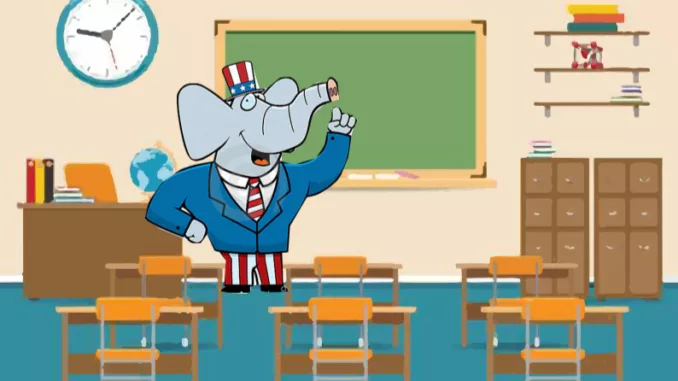
photo illustration: Abby Robinson
2020 was a year of unprecedented political events, and as they carry into 2021, the question of if it’s appropriate for teachers to discuss these events with students has surfaced.
Politics is a tricky subject to discuss in a classroom setting, and some students might feel uncomfortable doing so because of the teacher’s bias. The personal opinions and views of teachers can easily slip into the conversation, making the conversation uncomfortable and unproductive.
“I feel that as teachers, our job is to inform and not indoctrinate. Once you start giving your opinion on issues, you’re now trying to persuade and indoctrinate students to your personal beliefs, which is not the job of education,” Government and World History teacher Scott Tressler said.
To avoid letting opinions slip in, teachers who do talk about politics with their students have a responsibility to remain objective, regardless of their personal opinions.
“We are all prone to our individual biases, so it is incredibly important to be cognizant of the impact a teacher’s words has,” Principal Trond Smith said. “I do think it’s possible to speak objectively and it’s important to dignify that not everyone agrees.”
Educators judging students for their political beliefs is not tolerated and the Licensure Code of Professional Conduct for Ohio Educators makes this very clear.
“Conduct unbecoming to the profession includes…disparaging a student on the basis of race or ethnicity, socioeconomic status, gender, national origin, sexual orientation [and] political or religious affiliation,” according to the Licensure Code.
Having students lead the discussion is one way teachers can have these difficult conversations without letting their personal opinions get in the way and become an issue.
“By letting students guide the conversations and having teachers only really contribute to the conversation by prompting students, I think teachers can keep bias out,” junior Madelyn Braun said.
When teachers let students have the conversation amongst themselves and let them come to their own conclusions, current events can be discussed more often and their importance can be understood by more people.
“I think we all have biases and being a professional and understanding the group that you’re talking to is an important part of this,” Tressler said. “It’s imperative that you allow them to make up their own minds and you don’t allow your own biases to come in.”
Current political events are usually not discussed in schools because they can be controversial, but as more unprecedented things happen in the world of politics, many believe it’s important for teachers to not ignore them.
“We are living through an era that historians will write about for years to come. The things that are happening now are things many of us have never lived through and are worthy of conversation,” Smith said. “As educators, we have an obligation to address these events through that lens.”
If students have questions about political events, teachers can also answer them and help more people understand what’s going on in the world. This can be especially helpful with unprecedented events like the Jan. 6 riot on Capitol Hill.
“Students have asked me how I felt [about the riot] and I basically deferred to the idea that it’s not about how I feel,” Tressler said. “I think that any time we see riots and groups of people attacking police officers and buildings, it’s concerning for citizens who generally go about their day and follow the rules.”
While it may not be appropriate to have full length conversations in every class period, teachers can address major current events when they happen and help students understand them without taking away too much class time.
“When the Capitol riot happened, I felt that the teachers who were pointedly ignoring it and not bringing it up were trying to distract us,” Braun said. “When events like that occur, it’s inappropriate to try to sweep them under the rug. We are all mature enough to be able to have tough conversations, and it’s important for teachers to facilitate those conversations.”


